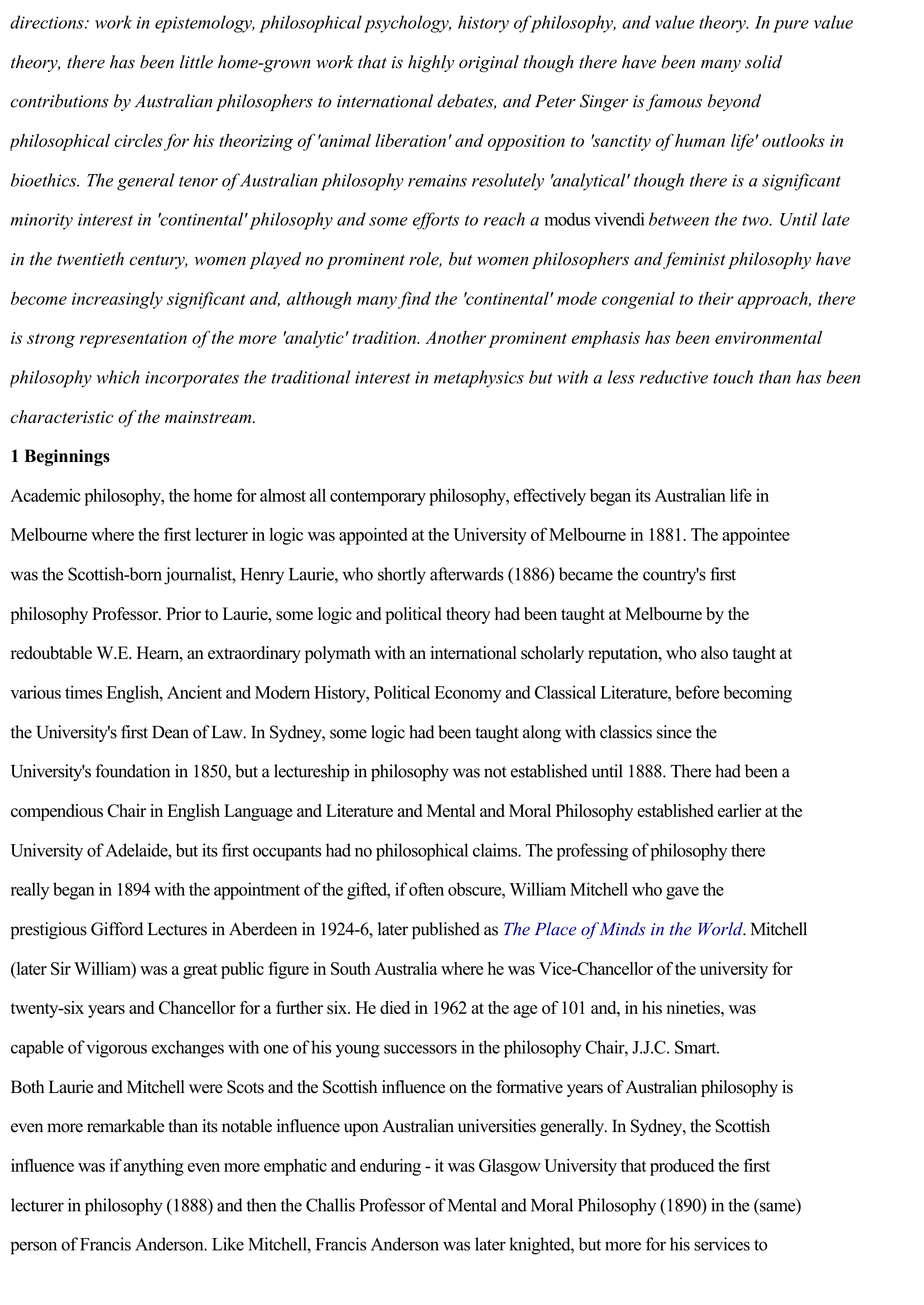Philosophy in Australia
Publié le 22/02/2012
Extrait du document
«
directions: work in epistemology, philosophical psychology, history of philosophy, and value theory.
In pure value
theory, there has been little home-grown work that is highly original though there have been many solid
contributions by Australian philosophers to international debates, and Peter Singer is famous beyond
philosophical circles for his theorizing of 'animal liberation' and opposition to 'sanctity of human life' outlooks in
bioethics.
The general tenor of Australian philosophy remains resolutely 'analytical' though there is a significant
minority interest in 'continental' philosophy and some efforts to reach a modus vivendi between the two.
Until late
in the twentieth century, women played no prominent role, but women philosophers and feminist philosophy have
become increasingly significant and, although many find the 'continental' mode congenial to their approach, there
is strong representation of the more 'analytic' tradition.
Another prominent emphasis has been environmental
philosophy which incorporates the traditional interest in metaphysics but with a less reductive touch than has been
characteristic of the mainstream.
1 Beginnings
Academic philosophy, the home for almost all contemporary philosophy, effectively began its Australian life in
Melbourne where the first lecturer in logic was appointed at the University of Melbourne in 1881.
The appointee
was the Scottish-born journalist, Henry Laurie, who shortly afterwards (1886) became the country's first
philosophy Professor.
Prior to Laurie, some logic and political theory had been taught at Melbourne by the
redoubtable W.E.
Hearn, an extraordinary polymath with an international scholarly reputation, who also taught at
various times English, Ancient and Modern History, Political Economy and Classical Literature, before becoming
the University's first Dean of Law.
In Sydney, some logic had been taught along with classics since the
University's foundation in 1850, but a lectureship in philosophy was not established until 1888.
There had been a
compendious Chair in English Language and Literature and Mental and Moral Philosophy established earlier at the
University of Adelaide, but its first occupants had no philosophical claims.
The professing of philosophy there
really began in 1894 with the appointment of the gifted, if often obscure, William Mitchell who gave the
prestigious Gifford Lectures in Aberdeen in 1924-6, later published as The Place of Minds in the World .
Mitchell
(later Sir William) was a great public figure in South Australia where he was Vice-Chancellor of the university for
twenty-six years and Chancellor for a further six.
He died in 1962 at the age of 101 and, in his nineties, was
capable of vigorous exchanges with one of his young successors in the philosophy Chair, J.J.C.
Smart.
Both Laurie and Mitchell were Scots and the Scottish influence on the formative years of Australian philosophy is
even more remarkable than its notable influence upon Australian universities generally.
In Sydney, the Scottish
influence was if anything even more emphatic and enduring - it was Glasgow University that produced the first
lecturer in philosophy (1888) and then the Challis Professor of Mental and Moral Philosophy (1890) in the (same)
person of Francis Anderson.
Like Mitchell, Francis Anderson was later knighted, but more for his services to.
»
↓↓↓ APERÇU DU DOCUMENT ↓↓↓
Liens utiles
- australia's aboriginal problem
- POUR UNE PHILOSOPHIE DE LA SOLITUDE [A Philosophy of solitude]. (résumé) de John Cowper Powys
- Miembros de Naciones Unidas Afganistán Etiopía Nepal Albania Islas Fiji Nicaragua Alemania Filipinas Níger Andorra Finlandia Nigeria Angola Francia Noruega Antigua y Barbuda Gabón Nueva Zelanda Arabia Saudí Gambia Omán Argelia Georgia Países Bajos Argentina Ghana Pakistán Armenia Granada Palau Australia Grecia Panamá Austria Guatemala Papúa-Nueva
- Miembros de la Commonwealth ESTADOS FECHA DE INGRESO Antigua y Barbuda (1981) Australia (1931) Bahamas (1973) Bangladesh (1972) Barbados (1966) Belice (1981) Botsuana (1966) Brunei (1984) Camerún (1995) Canadá (1931) Chipre (1961) Dominica (1978) Gambia (1965) Ghana (1957) Granada (1974) Guyana (1966) India (1947) Islas Fiji (se reincorporó
- Las islas más grandes del mundo ISLA SUPERFICIE (en km2) Australia* 7.

































